|
|
|
Sort Order |
|
|
|
Items / Page
|
|
|
|
|
|
|
| Srl | Item |
| 1 |
ID:
114237


|
|
|
|
|
| Publication |
2012.
|
| Summary/Abstract |
When the 2011 parliamentary election campaign started, Turkish political parties promised to draft a new constitution in their manifestos. Not surprisingly, after the election, the political parties that gained representation in parliament reiterated this promise to their constituents. Furthermore, hopes for a new constitution have increased with the beginning of the legislative session because the above-mentioned political parties have agreed to join the negotiation process without presenting any pre-conditions. However, each party has its own agenda and hopes for a new constitution might collapse when these agendas appear during the negotiation process.
|
|
|
|
|
|
|
|
|
|
|
|
|
|
|
|
| 2 |
ID:
114239
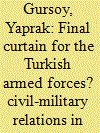

|
|
|
|
|
| Publication |
2012.
|
| Summary/Abstract |
After providing a brief overview of civil-military relations in Turkey prior to the June 12, 2011, general elections, this article focuses on the way in which the ruling Adalet ve Kalkinma Partisi (AKP), the opposition Cumhuriyet Halk Partisi (CHP), and the Milliyetçi Hareket Partisi treated this issue in their election campaigns. It argues that the AKP had a dual discourse on civil-military relations and the CHP occasionally showed signs of defending the role of the military in Turkish politics. However, both the victorious AKP and the main opposition CHP adopted policies that accentuated the reduction of the military's role in politics. An analysis of the election campaigns and results suggests that until the next elections, civilian control over the military will further increase.
|
|
|
|
|
|
|
|
|
|
|
|
|
|
|
|
| 3 |
ID:
114240
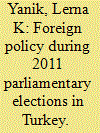

|
|
|
|
|
| Publication |
2012.
|
| Summary/Abstract |
This article focuses on the foreign policy sections of 2011 election manifestos of the Adalet ve Kalkinma Partisi (Justice and Development Party) (AKP), the Cumhuriyet Halk Partisi (Republican People's Party) (CHP), the Milliyetçi Hareket Partisi (Nationalist Movement Party) MHP, and the Emek, Demokrasi ve Özgürlük Bloku (Labor, Democracy and Freedom Bloc) (EDÖB) the pre-election Bars ve Demokrasi Partisi (Peace and Democracy Party) (BDP). Foreign policy is both an issue and a non-issue for Turkish electorate because although foreign policy issues have almost no impact on voters choices, the parties still continue to devote space to foreign policy performances, promises, and projections in their election manifestos. The analysis of 2011 election manifestos reveals that the AKP primarily envisions a Turkey with more commonalities with the East than with the West, but yet ranked Turkey's relations with Europe and the West higher; for the MHP while Turkey's commonality with the East was defined in terms of common history and culture, the West was portrayed to have commonness only in terms of values; the CHP equated European values with universalism and prioritized Turkey's ties with Europe; finally, the EDÖB manifesto was an anti-thesis of all manifestos where foreign policy was instrumental for the ideological goals of the bloc and subsequently of the BDP.
|
|
|
|
|
|
|
|
|
|
|
|
|
|
|
|
| 4 |
ID:
114234
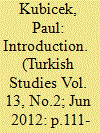

|
|
|
|
|
| Publication |
2012.
|
| Summary/Abstract |
Turkish voters elected a new National Assembly on June 12, 2011. As expected, the incumbent Justice and Development Party (AKP, Adalet ve Kalkinma Partisi) prevailed. This brief introductory article provides background on the elections and the main Turkish political parties. It also introduces the various contributions for this special issue that will analyze the impact this election will have on both domestic and foreign policy.
|
|
|
|
|
|
|
|
|
|
|
|
|
|
|
|
| 5 |
ID:
114238
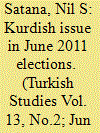

|
|
|
|
|
| Publication |
2012.
|
| Summary/Abstract |
This article analyzes the Kurdish issue in various aspects before the June 2011 elections. The main research questions include what constitutes the major grievances of the Kurds; how the ongoing conflict is framed as "Kurdish issue" versus a "terrorism problem" and how major political parties in Turkey approach the issue and its solution in their 2011 election manifestos and rallies. This article contributes the literature on the Kurdish issue in particular and Turkey's democratic consolidation in general by identifying the problems and political views of all relevant sides. Finally, based on both a historical and empirical analysis, the article reflects on the reasons why the Adalet ve Kalkinma Partisi and Baris ve Demokrasi Partisi have become the major players in addressing the Kurdish issue after the 2011 election. The findings are relevant for Turkish democratic consolidation in particular and the democratization literature in general.
|
|
|
|
|
|
|
|
|
|
|
|
|
|
|
|
| 6 |
ID:
114242
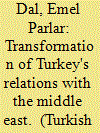

|
|
|
|
|
| Publication |
2012.
|
| Summary/Abstract |
In light of recent developments in the Middle East, in particular, the Arab revolts in the first few months of 2011 and the AKP's June 2011 election victory, this article aims to define the changing parameters of Turkey's new "Middle Eastern policy" under the AKP government, which is based on a new civilizational discourse and a differentiated geopolitical approach. It also discusses the basic dynamics and ideological and doctrinal background of Turkey's new Middle Eastern policy in order to understand the opportunities and constraints of its potential "facilitator and conciliator" role in the changing political circumstances of the region following the recent Arab uprisings. Despite the limits of Ankara's new civilizational and geopolitical orientation in both discourse and policy, which have at times undermined Turkey's neutrality on intra-Arab or Iranian-Arab axes and its facilitation role between Israel and its regional adversaries, Turkey's new regional posture for the Middle East represents an awakening rather than an illusion.
|
|
|
|
|
|
|
|
|
|
|
|
|
|
|
|
| 7 |
ID:
114235


|
|
|
|
|
| Publication |
2012.
|
| Summary/Abstract |
This article offers an analysis of basic trends in the post-1980 Turkish party system. How has the Turkish party system evolved during the last eight elections? How do these characteristics change with the rise of the Justice and Development Party (AKP, Adalet ve Kalkinma Partisi)? Utilizing statistical methods informed by fieldwork conducted during the parliamentary elections of 2002, 2007, and 2011, the article suggests that Turkish elections exhibit unmistakable patterns of regionalization, which in turn have strongly contributed to the AKP's electoral ascendancy. Barring external shocks such as major economic crisis or leadership replacement, these regional patterns make it difficult for the opposition parties to effectively challenge the AKP.
|
|
|
|
|
|
|
|
|
|
|
|
|
|
|
|
| 8 |
ID:
114236
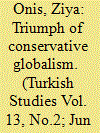

|
|
|
|
|
| Publication |
2012.
|
| Summary/Abstract |
The Adalet ve Kalkinma Partisi (AKP), following its third successive electoral victory appears to be far more entrenched than its earlier center-right counterparts in Turkish politics. This article highlights the key political economy fundamentals that have rendered the AKP experience unique within the Turkish context. Accordingly, strong economic performance in context of "regulatory neo-liberalism" helped by a favorable global liquidity environment in the early parts of the decade was a key contributor to the party's continued electoral success. The party also made effective use of a variety of formal and informal redistributive mechanisms, which is referred as "controlled neo-populism" in this article, to enlarge its electoral coalition. Furthermore, the fact that Turkey did not suffer a typical old-style economic crisis in the context of the global turmoil of 2008-2009 was important for the AKP's electoral fortunes. Concomitantly, the AKP government was quite effective in managing the global financial crisis politically and it took advantage of its assertive "new" foreign policy approach. Finally, this study argues that the AKP also benefited from the fragmented opposition.
|
|
|
|
|
|
|
|
|
|
|
|
|
|
|
|
| 9 |
ID:
114241


|
|
|
|
|
| Publication |
2012.
|
| Summary/Abstract |
This article analyzes Turkey's relationship with the European Union (EU) against the background of the latest Turkish parliamentary elections in June 2011. The main argument is that Turkey's European transformation at home and abroad will continue under the third term of the Justice and Development Party rule, yet Turkish rulers will increasingly find it difficult to put EU membership issue at the center of this process. At present, it appears that neither is the EU eager and flexible as to offer Turkey credible membership prospects nor is Turkey's ruling party maintaining the same degree of commitment to the EU as it had during its first term in government. Rather than the dynamics of the accession process, the growing need to find a solution to the decade-long Kurdish dispute in a liberal-democratic fashion as well as Turkey's ability to deal with the rising foreign and security policy challenges in the context of the Arab Spring will shape Turkey's European transformation in years ahead.
|
|
|
|
|
|
|
|
|
|
|
|
|
|
|
|
|
|
|
|
|